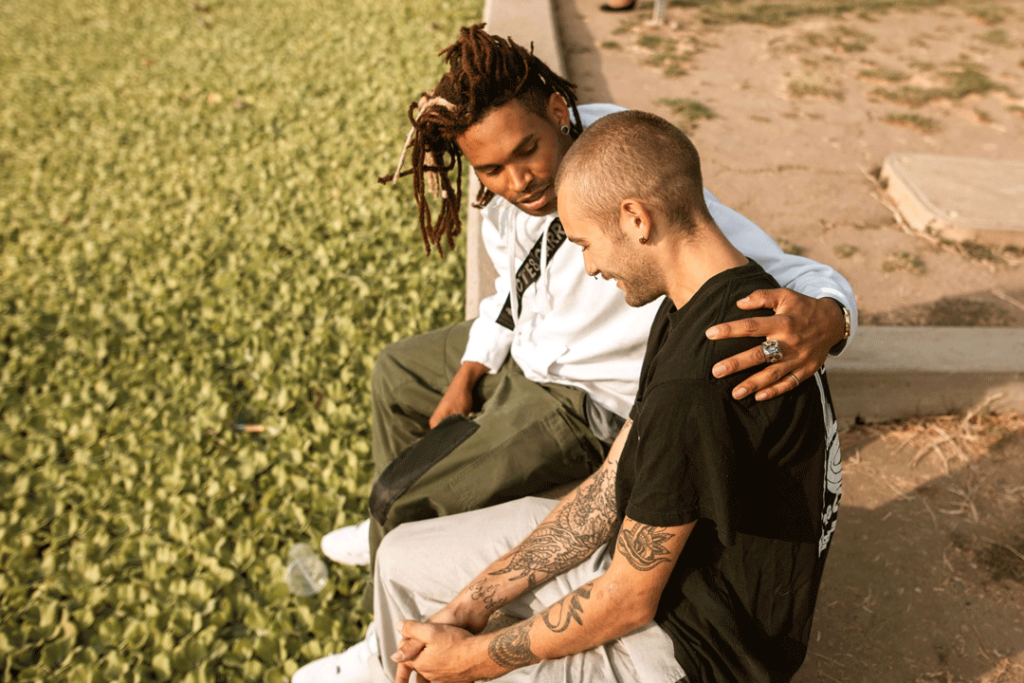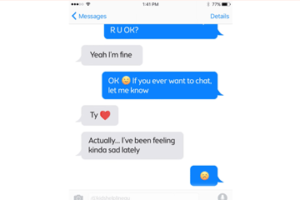What can I do to help?

What can I do to help?
Things you can do to help a friend in need
Make sure you’re ok yourself, before helping someone else. If you don’t think you can help, don’t push yourself – let a trusted adult know what you’ve noticed about your friend.
It is always a good thing to start a conversation with someone you think may be showing signs of suicide. It allows you to get help for the person, and just talking about it may help the person feel less alone and more cared about and understood.
If you feel ok to contact your friend, privately contact them (message or call) however you feel most comfortable.
Remember: Make sure you let a trusted adult know you’re doing this, and that you can call lifeline (13 11 14) or Kids Helpline (1800 55 1800) to support you with what to do if you’re unsure.

Some pointers
About how to start a conversation with someone you think may be showing signs of suicide.
Do’s
- Keep calm
- Let them know you care and that you see that they are hurting
- Check if they are in danger
- Ask if they have support
- Let them know there are support options
Dont’s
- Don’t blame them or reject what they are feeling
- Don’t dismiss their distress
- Remember it’s not an interrogation
Ask. Listen. Get help. Check in.
If you’re sworn to secrecy…
If your friend is displaying signs of suicide but wants you to keep it secret, it is better for you and for them that you do not agree to that promise. Someone who is seriously thinking about suicide may not realise they need and can access help.
It is important you let a trusted adult know what is going on.
Your friend may be angry at you for seeking help at first, but you are doing the best thing by them.
And if your friend is refusing help…
It’s normal for people to refuse help. Don’t put pressure on them to accept your help.
- Ask them if there is anyone they are speaking to about their worries.
- If there isn’t – ask if there is someone they may want to talk to. They might just need support to consider it and make the initial contact. This could be someone like a teacher, coach, or a family member.
- Give them some time – they might not be ready to talk right now. Show you care and acknowledge that you can see they’re going through a tough time and you’ll be there whenever they need.
- If you’re still concerned about them, you can always report their post(s) to the appropriate platform or talk to a trusted adult.


Was this page helpful?
Modal Content
Add groups below and assign an anchor link under “advanced” to create a modal. Link to it from a button and make the button style “modal”.
How would you start the discussion with someone you’re worried about? transcript
How would you start the discussion with someone you’re worried about?
So I’d first think about why am I worried and the warning signs that I have noticed, and I would approach that person, hopefully in a one-on-one or in an environment that they feel comfortable with and ask, ‘Is there anything you would like to talk to me about?’.
Just be direct and ask them, ‘Hey, how are you going? Are you okay?’ ‘How are you, like, how are you really feeling?’ ‘Have you got anyone that you talk to about that? Is there anyone that you confide in currently around that?’ ‘What has been happening for you? Let me know’.
So giving them that safe space to just speak. And just seeing if they wanted to go do something with you, like go to the movies or go to the beach or even just come hang out with you. Please feel free to ask are they suicidal.
Be direct, because you’re giving them the opportunity to tell you more to their story, but they might not feel comfortable to initially tell you because it can be a scary thing to do. But at least give them the opportunity to express themselves and tell you more. And that you never know that might actually allow you to have a deeper discussion and get them the help that they need.
Who are some trusted adults I can ask to help me? transcript
Who are some trusted adults you can ask to help you?
You’d know that someone is a trusted adult when they, you know, you share your feelings and they really, really listen. And they reassure you that you can get through it together. Stand by you. Someone you can go to take action, but also to make sure they’re listening to you and understand the situation.
For some people it can be their parents and if people don’t have that relationship with their parents or any of their family, you can have teachers. Someone’s parent. My boss, who’s like my mentor in a way.
Family friends or their babysitters. Or even lifeguards at the beach or life savers.
Counsellors. There’s lots of free counselling services available.
Trusted teachers, mainly my sports teachers and my coaches at sport.
For me, personally, they were the people that I felt knew enough about me and had the experience and the knowledge to help me deal with these things.
So looking at people who show up and hold comfortable space for you and that feel safe. Yeah. That’s what I’d look for.
If your friend is refusing help, what should you do? transcript
If your friend is refusing help, what should you do?
I think it’s important that you continue to lay out the options for them.
It’s important that you continue to try, give more avenues for them, lay out more options, more roads that they can go down.
Assure them that there is help for when they’re ready.
Just make sure that they know it’s there and always gonna be there and that you are gonna be there. Again, just letting them know that you’re always there for them. If it’s at a crisis point, talking to someone who you trust can always help.
Sometimes the best decision is to talk to a trusted adult. Reach out to a trusted adult. Make sure you go to a trusted adult or someone who can really take action. Talk to a trusted adult if your friend didn’t want help because it could get to the point where there they didn’t realise that they’re too far gone and they really need the help by someone professional.
So you could go to headspace. They’ve got lots of help there and they’re confidential. So your parents wouldn’t even need to find out about it. Or you could go onto Lifeline or Kids Helpline and they will also really help you. It’s just something that you have to do.
They may not appreciate it at that time, but they will appreciate it and thank it in the future.






